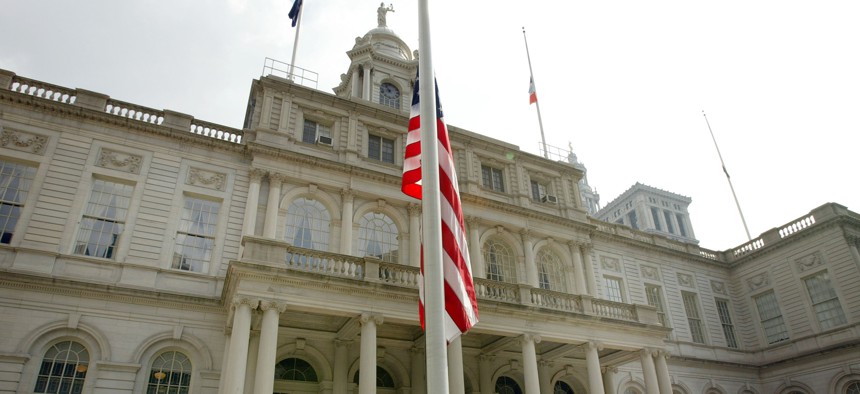Minority and women-owned businesses get tiny increase of NYC spending
Comptroller Brad Lander’s annual procurement report found that 5.3% of city contracts and purchase orders registered in Fiscal Year 2023 went to MWBEs, up from 5.2% in the previous fiscal year

New York City Hall (Spencer Platt / Staff)
Certified Minority and women-owned enterprises secured 5.3% of New York City contracts and purchase orders in Fiscal Year 2023, compared to 5.2% in the previous year, according to an annual procurement report released by Comptroller Brad Lander.
The analysis also found that less than 10% of eligible contracts went to MWBEs, and that just over 1% of spending went directly businesses run by Black, hispanic and women-of-color.
"MWBEs deserve their fair share of city contracts, yet this year’s disappointing numbers fall woefully short of where we need to be,” Lander said in a released statement.
Lander credited the Adams administration for making progress on achieving greater equity in city contracting, “but the data tells a story of how far there is to go.”
The comptroller made recommendations for streamlining how businesses connect wiht the city, being more “diligent” about setting and monitoring goals, and improving how contractors, particularly in human services use MWBEs as subcontractors. “With stronger management and coordination, we can reverse these unacceptable trends and move toward fairness in City contracting,” Lander said.
Wallace Ford II, a professor at Medgar Evers College’s Department of Public Administration who helped launch MWBE programs in New York City in the 1980s, called the slow progress “sad,” but not surprising.
“It is not going to change overnight. It will require mandates and we need to address that there is a problem,” he told New York Nonprofit Media. Ford put the blame on previous mayoral administrations, going back to former Mayor Rudy Giuliani who ended significant parts of the program shortly after being inaugurated in 1994.
Michael Garner, who was appointed last year as the city’s Chief Business Diversity Officer, said the city was awarding contracts to MWBEs through agencies such as the Education Department, New York City Hounsing Authority and Economic Develompment Corporation.
“The administration is the largest under-one-umbrella, and we’ve made improvement in driving those contract awards,” he told NYN Media. “We’re working on improving and designing smaller packages. The amount of contracts is achieving MWBE goals.”
Some industries award MWBEs more than others. In FY23, the industry that saw the most MWBEs obtain prime contracts was for goods at 64%. The least contracts went to the MWBEs with construction businesses at 7.5%. Ford recommended creating collaboration opportunities for MWBE construction firms of various sizes, which could help the programs more so than the goods and services sector.
“Smaller construction firms can work with bigger firms and learn how the larger business work,” Ford said. “They just need to understand they need to collaborate. But we got a long way to go and we are not close to being equitable.”
Earlier this month, a federal judge in Texas ruled that the Minority Business Development Agency had to include all races after white business owners accused the federal agency of discrimination. The agency helps 33 states and Puerto Rico to obtain financing and government contracts, similar to New York City’s M/WBE program.
Ford compared the ruling to an ongoing historical pattern of how Black people are treated in America and that taking away access to capital leads disparity.
“You got to have capital access because you can’t climb a mountain from 10 feet up,” he said.”It is a shot at equality, so this is antithetical. It’s not about fairness.”
NEXT STORY: How nonprofits benefit from Donor Advised Funds
